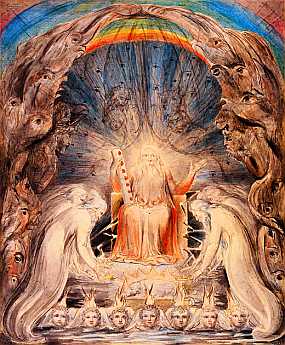I know a man in Christ who fourteen years ago was caught up to the third heaven—whether in the body or out of the body I do not know, God knows. And I know that this man was caught up into paradise—whether in the body or out of the body I do not know, God knows— and he heard things that cannot be told, which man may not utter. On behalf of this man I will boast, but on my own behalf I will not boast, except of my weaknesses.
—2 Corinthians 12:2-5
Why is it that so many in the Christian Church, especially in the West, live to throw the baby out with the bathwater?
I see this tendency especially from those petrified that God will come along and shake up His Church by doing something they would classify as “weird.”  I think that if you took those folks and put them into every biblical scene featuring the miraculous, they’d be quaking with fear with their hands over their eyes. They’d be the ones frozen stiff before the parted Red Sea screaming, “No! You can’t make me go through there!”
I think that if you took those folks and put them into every biblical scene featuring the miraculous, they’d be quaking with fear with their hands over their eyes. They’d be the ones frozen stiff before the parted Red Sea screaming, “No! You can’t make me go through there!”
So these poor saints live to attack anything that threatens to undo their dusty religiosity. Unfortunately, in too many cases, that “anything” just happens to be God.
Now I perfectly understand the need to filter out heretical and false manifestations, but that’s why the Lord gave us discernment. Blanket condemnation of all such experiences, instinctive in these fearful saints, fails the discernment test. Nowhere in the Scriptures will you find “One bad apple ruins the whole bunch.” (If that were true, I suspect all our churches would be ruined!)
Instead, the Holy Spirit empowers our discernment. The Bible provides some basis for making distinctions between wrong and right, while the Spirit fills in the particulars. This is life in the Spirit, and it requires us to know His voice when He speaks to us in our day to day existence.
This brings us to today’s tossed baby, Christian mysticism.
I don’t know about the baby-tossers, but I can’t read the Bible and not see the mystical. As noted in the passage that starts this post, the Apostle Paul himself thought nothing of mystical experiences, such as being caught up in a heavenly realm where inexpressible realities can be glimpsed. Paul goes so far as to boast about the man who experienced this (likely Paul, as most commentators note).
The prophet Isaiah had a vision of God, the Holy One’s train filling the temple. He saw angels and they symbolically purged his sin with a touch of coal to the lips. Ezekiel glimpsed his famous wheel within a wheel. John fell prostrate before an angelic messenger who delivered a vision of the end of all things. Jacob’s ladder. Abraham entertaining three visitors. The inner sanctum of disciples witnessing Jesus’s transfiguration.
The Bible overflows with the mystical. So how is mysticism bad?
Some would claim that all these things vanished with the death of the Apostle John. That mystical experiences do not happen today.
Tell that to the Irish, though.
Last weekend, we celebrated St. Patrick’s Day. One could argue that no evangelist exceeded Patrick, for 120,000 conversions are directly tied to his ministry in the Emerald Isle. But to what did Patrick attribute his burning desire to evangelize the Irish?
From a classically mystical source: a dream.
Patrick, ensconced in England, had a dream one night of Irish druids begging him to come preach the Gospel to them. He wasn’t reading the Scriptures for this revelation. He wasn’t down on his knees praying. He dreamed it.
The Bible says this:
But Peter, standing with the eleven, lifted up his voice and addressed them: “Men of Judea and all who dwell in Jerusalem, let this be known to you, and give ear to my words. For these people are not drunk, as you suppose, since it is only the third hour of the day. But this is what was uttered through the prophet Joel: “‘And in the last days it shall be, God declares, that I will pour out my Spirit on all flesh, and your sons and your daughters shall prophesy, and your young men shall see visions, and your old men shall dream dreams; even on my male servants and female servants in those days I will pour out my Spirit, and they shall prophesy.
—Acts 2:14-18
Now as far as I can tell, we’re still in the last days. I think most of us would agree on this. So how is it NOT still true that God will speak to us through dreams and visions? I find it impossible for anyone to argue against the validity of dreams and visions for revelation. Consider what the 120,000 saved through Patrick’s ministry think about mystical revelation through dreams.
A.W. Tozer, one of Evangelicalism’s greatest prophets, had no qualms with the mystical. Even the most casual readings of his many books and sermons reveals Tozer’s heart that we Christians should pursue a mystical intimacy with God that defies earthly definitions. Tozer was known for his keen understanding of the writings of noted medieval mystics such as Julian of Norwich (who many of Tozer’s good friends referred to jokingly as his “girlfriend”), Teresa of Àvila, Meister Eckhart, and others. Tozer recommend that we Evangelicals read mystic literature such as The Cloud of Unknowing and The Dark Night of the Soul. Why? To cultivate a depth of intimacy with God that transcended the casual dabbling in Him afflicting so many of us time-burdened Evangelicals, to scry the secrets of the saints who have gone before us.
Because I hold Tozer in high regard, I’ve read many of those mystics and their writings. I’ve found them fascinating. But more than this, I found they relayed understandings of God I did not possess. Those mystics have been to the mountain of God, so they offer a valuable map, a treasured insight. Their talk of rapturous union with God should inspire us, not drive us to doubt the reality that we human beings can approach the Divine and know Him intimately! Sometimes I wonder if some of us merely wish to keep others from that deep intimacy for no other reason than we have not experienced it ourselves; our jealousy drives us to deny others the joy those few have found.
Many Protestants revere the Reformation, but they balk at anything that came before that. What a loss! As we stroll back in time to the Medieval era and Dark Ages, when some of the noted mystics lived, the less confident many of the mystic-bashers become, as if no big “c” Church existed at all during those times. That’s foolishness, though, and for some to act as if nothing can be learned from the Christians of those days, many of whom would be branded mystics by today’s Evangelicals, is nothing more than jealous pride.
Mysticism’s core ideal that knowledge of God and His ways can’t be explained in perfectly rational terms didn’t bother those Christians of that era. But it bothers those who live on the other side of the Renaissance and the Enlightenment.
If anything, the modern antagonism toward Christian mysticism has little of its basis in Scripture’s and the Holy Spirit’s illumination, and far more in the rationalism and anti-supernaturalism wrought by modernism (as ushered in by the Renaissance and the Enlightenment). Oddly enough, the real damage to Christianity came not from mysticism as practiced pre-Reformation, but from this post-Reformation upheaval in philosophy. Odder still, the stepchildren of the god-denying Enlightenment are those very Christians who oppose supernaturalism (especially as it pertains to the charismata), who endorse a sort of sanctified scientific rationalism that turns the tables and declares Christians being caught up into the third heaven not only not possible, but part of a damnable plot to subvert Christianity!
Who is the real wolf in sheep’s clothing? The mystics or the scientific rationalists? I would contend the latter far better fit the bill.
And so we’ve paid dearly within Christianity because of anti-mystic crusading. The rationalists have shoved the awesome God into a small box convenient enough to be understood. Miracles? Nah. Dreams and visions as guidance? No way. Only superstitious fools would embrace such nonsense.
Worse, any revival in mysticism within the Church is disingenuously labeled Gnosticism by the critics. But those who toss around the Gnosticism label do so haphazardly and with little regard for the truth.
Gnosticism is anti-matter, which Christian mysticism is not. As a result, Gnosticism denies the incarnation of Christ, which Christian mysticism certainly does not. Gnosticism holds to a dualistic worldview, which Christian mysticism does not . Gnosticism believes that secret knowledge necessary to salvation is held by a select few, and only a select few who seek that knowledge get it. Christian mysticism holds that deeper knowledge of God is the desire of all those filled by the Holy Spirit, but this knowledge is open to all and can be grasped by any who come to the Lord.
To stress that latter point, would anyone reading this doubt for one second that a great Christian who has sought the Lord through years of prayer would know more about God and His ways than the new convert? Does that righteous old saint (who may at some point in life have been swept up into the ecstasy of the third heaven by the Spirit) possess a deeper knowledge? Would anyone seriously label him a Gnostic? Or the third-heaven-visiting Paul for that matter?
No, in most cases the Gnosticism label is a fraudulent scare tactic.
This is not to say that all mysticism tagged “Christian” is. In the second part of this examination of mysticism, we’ll examine the criticism leveled against modern practices of mysticism and see in what cases the accusations against it should be heeded.
 Unlike Peter above, they’ve opened their minds to too many foreign sources of supposed truth, only to stumble into error.
Unlike Peter above, they’ve opened their minds to too many foreign sources of supposed truth, only to stumble into error.
 People like Saul on the road to Damascus. Guys like St. Patrick, whose ministry to hundreds of thousands of people sprang from a dream he received as he slept. Or Dwight Moody, one of America’s great evangelists, who encountered God in a mystical, overwhelming way as he walked the streets of New York City, and his ministry immediately transformed in that meeting from good to great.
People like Saul on the road to Damascus. Guys like St. Patrick, whose ministry to hundreds of thousands of people sprang from a dream he received as he slept. Or Dwight Moody, one of America’s great evangelists, who encountered God in a mystical, overwhelming way as he walked the streets of New York City, and his ministry immediately transformed in that meeting from good to great.
 I think that if you took those folks and put them into every biblical scene featuring the miraculous, they’d be quaking with fear with their hands over their eyes. They’d be the ones frozen stiff before the parted Red Sea screaming, “No! You can’t make me go through there!”
I think that if you took those folks and put them into every biblical scene featuring the miraculous, they’d be quaking with fear with their hands over their eyes. They’d be the ones frozen stiff before the parted Red Sea screaming, “No! You can’t make me go through there!”